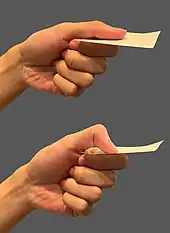| Froment's sign | |
|---|---|
 | |
| Positive Froment's sign (below) | |
| Differential diagnosis | palsy of the ulnar nerve |
Froment's sign is a special test of the wrist for palsy of the ulnar nerve, specifically, the action of adductor pollicis.[1] Froment's maneuver can also refer to the cogwheel effect from contralateral arm movements seen in Parkinson's disease.
Process of examination
To perform the test, a patient is asked to hold an object, usually a flat object such as a piece of paper, between the thumb and index finger (pinch grip). The examiner then attempts to pull the object out of the subject's hands.[2]
- A normal individual will be able to maintain a hold on the object without difficulty.
- However, with ulnar nerve palsy, the patient will experience difficulty maintaining a hold using the adductor pollicis. They will instead use the flexor pollicis longus of the thumb to grip the paper causing a flexion of the interphalangeal joint.[3]
- Clinically, this compensation manifests as flexion of the interphalangeal joint of the thumb (rather than adduction, as would occur with correct use of the adductor pollicis).
- The compensation of the affected hand results in a weak pinch grip with the tips of the thumb and index finger, therefore, with the thumb in obvious flexion.[3]
- Note that the flexor pollicis longus is normally innervated by the anterior interosseous branch of the median nerve.
- Anterior interosseous branch comes off more proximally than the wrist, in evaluating lacerations near the wrist.
- Simultaneous hyperextension of the thumb MCP joint is indicative of ulnar nerve compromise. This is also known as Jeanne's sign.[2]
Eponym
It is named after French neurologist Jules Froment.[4][5]
References
- ↑ "Ulnar Nerve - Wheeless' Textbook of Orthopaedics". Retrieved 2008-01-26.
- 1 2 Jeff G. Konin et al. Special Tests for Orthopedic Examination: Third Edition. Thorofare, NJ. SLACK Incorporated, 2006.
- 1 2 Richardson, Craig and Fabre, Gerd. '"Froment's Sign." Journal of Audiovisual Media in Medicine. Vol. 26, No. 1 (2003):34.
- ↑ synd/1970 at Who Named It?
- ↑ Froment, J. (1915). "La préhension dans les paralysies du nerf cubital et le signe du pouce". La Presse Médicale. Paris. 23: 409.
This article is issued from Wikipedia. The text is licensed under Creative Commons - Attribution - Sharealike. Additional terms may apply for the media files.